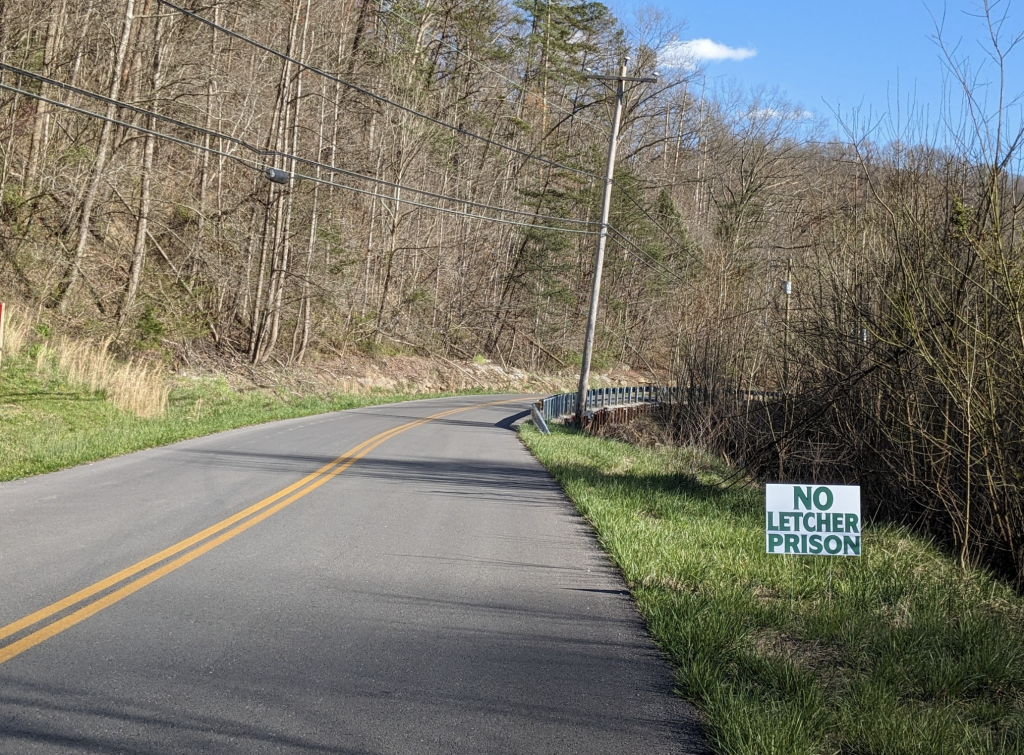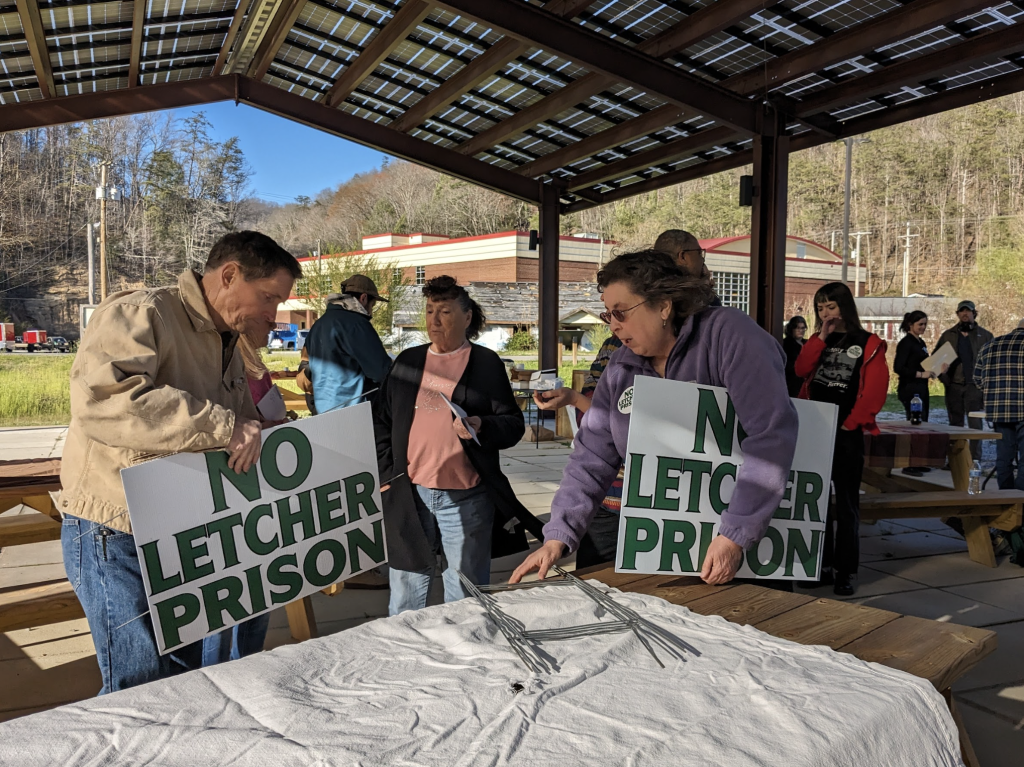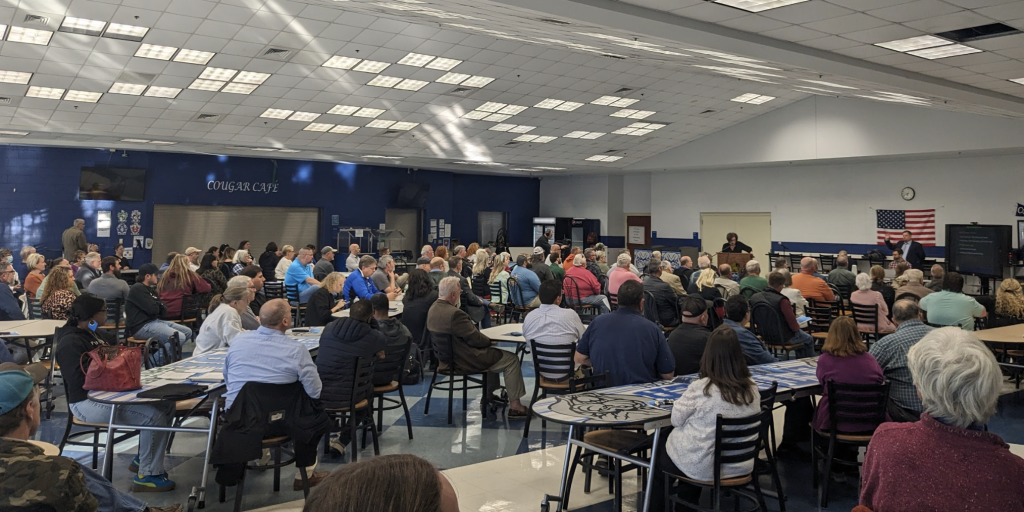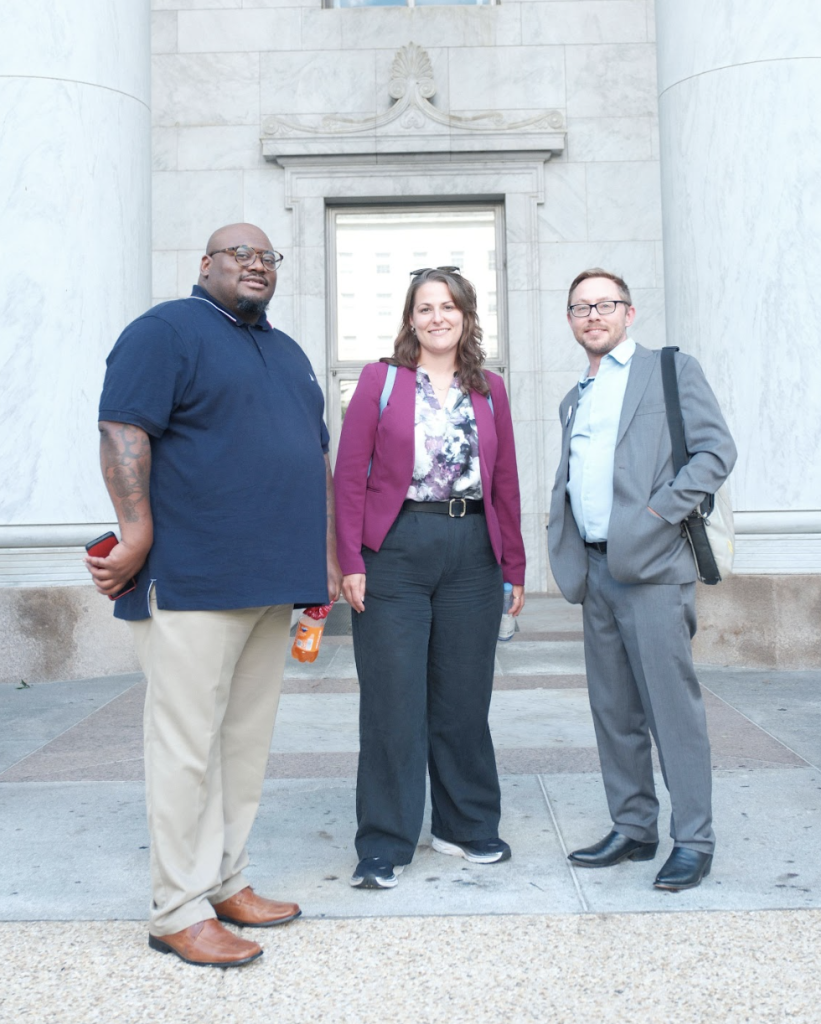Community members resist proposed Eastern Kentucky Prison
Chandon Thomson contributed to the reporting for this article
On Oct. 28, the federal Bureau of Prisons approved and authorized plans to build a 1,400 bed medium/ minimum security prison on a 500 acre former surface mine in Letcher County, Kentucky. The plan, first announced by Rep. Hal Rogers, R-Ky in July of 2023, prompted renewed opposition within the community, with some residents concerned that the facility would adversely impact the community, economy and environment. In a statement, Rogers said that he is “thrilled” at the decision, but prison opponents say the fight is far from over.
The proposed prison, called Federal Correctional Institute/Federal Prison Camp Letcher, would be built on a reclaimed mountaintop removal coal mine in Roxanna, near Whitesburg. The site is close to homes, a coal sludge impoundment and a stand of old-growth forest known as Lilley Cornett Woods. Rogers, who has represented Eastern Kentucky in Congress since 1981, has long championed prisons as an economic driver for the region. With a price tag of over $500 million in taxpayer money, FCI/ FPC Letcher would be the fourth federal prison built in Rogers’ district since 1992.

An earlier version of the proposal was canceled in 2019 after significant local and national opposition raised concerns about impacts to the environment, the local community and to federal inmates and correctional officers. Then-President Donald Trump excluded the prison in the budget proposal he sent to Congress in 2019. The federal Bureau of Prisons eventually dropped the proposal after a group of inmates and two local conservation organizations sued the bureau over allegations that the planning process did not adequately take environmental and human health impacts into account.
The revived proposal is likely to face similar litigation.
“With the previous prison threat, the Trump administration tabled it in 2019, but the Record of Decision had been signed back in 2018,” said Artie Ann Bates with Concerned Letcher Countians, a community organization that opposes the prison. “So this is far from a done deal.”
“The decision to build the prison was supposedly final last time Hal Rogers tried to force this on our community back in 2018,” continued Bates. “But our movement kept fighting it and ultimately defeated it back then, and that’s exactly what we’re going to do again.”
Rogers has lauded the recent decision as a win for Eastern Kentucky’s economy. In a March 2024 statement, Rogers said the prison would “add more than 300 jobs in our region, employing people from surrounding counties, and providing other economic development opportunities.”
But not everyone in Letcher County agrees.

“The foundational principle for anything in this community should be: Does it inspire and uplift young people,” said one community member who spoke with Appalachian Voices in June, on condition of anonymity out of concern that publicly opposing the prison would cause tension amongst friends and family.
At a public hearing in May for the proposal’s Draft Environmental Impact Statement, more than 40 members and supporters of Concerned Letcher Countians spoke out against the prison, while a similar number of people spoke in favor.
“My wife has said she never wants to leave this county where she was raised,” said Jacob Mack-Boll at the public hearing. “We’re raising our daughter here. I don’t want this to be her future. I want our young people to have bright opportunities where they value human life and don’t see our economic future as dependent on the suffering of other people.”
“The [Environmental Impact Statement] says construction employment and long-term employment will be small in terms of people from Letcher County,” said Elvenia Blair of Concerned Letcher Countians. “The EIS really refutes a lot of the promises that proponents are making.” At the time of her interview with The Appalachian Voice, Blair was speaking of the Draft Environmental Impact Statement. The final EIS includes the same language Blair is referring to.
According to an analysis by the Kentucky Policy Institute, poverty levels have remained high, total employment has fallen and median household incomes have remained low over the past two decades in the three Eastern Kentucky counties that already have federal prisons.

In addition to the half-billion dollars of general treasury funds Congress has allocated for FCI/FPC Letcher, construction of the prison may also be subsidized by the Abandoned Mine Land Economic Revitalization program. This is a federal fund, administered by state and tribal governments, that underwrites economic development and reclamation projects on or near pre-1977 coal mine sites. In 2017, the Kentucky Energy and Environment Cabinet designated approximately $4 million of AMLER money to design and construct the water infrastructure the prison would require, along with other municipal water improvements in the area. Though that project was canceled, the state kept these funds designated for the Roxana area and FCI/FPC Letcher.
The Letcher County Water and Sewer District posted a public notice on July 5, soliciting bids on a contract to build more than 21,000 linear feet of water lines to service the proposed prison, advising bidders that the project is expected to be funded through AMLER, as well as money from the U.S. Army Corps of Engineers.
For Concerned Letcher Countians, providing water to the prison is not an acceptable use of government funds in a region that was hit by a catastrophic flood two years earlier, exacerbating already high levels of poverty and related issues like homelessness and drug addiction. With support from Appalachian Voices, the organization that publishes The Appalachian Voice, Concerned Letcher Countians sent a letter to Gov. Andy Beshear’s administration in July, expressing their opposition to the state’s designation of AMLER funds for the project.
The letter explains that AMLER funds should be used for “activities that repair un-reclaimed mining features such as exposed highwalls, open portals, refuse piles and the like, and that provide a clear and tangible economic benefit to the community, such as industrial or recreational infrastructure.”
It goes on to say that, “FCI/FPC Letcher misses the mark on both counts,” explaining that the proposed prison site has been fully reclaimed and undisturbed for nearly 30 years, and that FCI/FPC Letcher would not address existing needs in the area.

“We need housing for the flood victims,” says Elvenia Blair. “We need a drug rehab where people can stay for six months to a year to two years, whatever it takes. … And that would be a lot of jobs. [Prison proponents] say, ‘We want our children to have jobs here. We want them to work and not move away.’ Okay, are we asking the children what they want to do for a career? I have asked a few of my nephew’s friends … and they say, ‘In no way do we want to live and work in a prison.’”
In June, a group of Eastern Kentucky residents traveled to Washington, D.C., with the Alliance for Appalachia to lobby Congress on a number of issues related to coal mining and reclamation, including FCI/ FPC Letcher. The group spoke out against the prison as an economic transition strategy, and objected to AMLER funds being used in this way. Alliance for Appalachia organizers are planning to return to D.C. in 2025 to lobby the new Congress that will be sworn in early January.
House Republicans had originally sought to include a measure, known as Section 223, in an appropriations bill that would have designated the federal courts in the Eastern District of Kentucky as the sole venue for any legal challenges to FCI/ FPC Letcher. This measure was designed to prevent prison opponents from filing suit in another court where judges are expected to be sympathetic to anti-prison arguments. Nothing resembling Section 223 was included in the stop-gap funding bill passed by Congress in September, marking a victory for Concerned Letcher Countians and their allies, at least until the stop-gap funding bill runs out in December.
“We don’t need more prisons — we need affordable housing,” says Dee Parker, a member of Kentuckians For The Commonwealth and the Alliance for Appalachia who traveled to Washington, D.C. “Building this prison would be an environmental catastrophe, straining our already outdated and fragile infrastructure. This site, a reclaimed mine, is finally starting to heal.”
Related Articles
Latest News

Leave a comment
Your email address will not be published. Required fields are marked *
One response to “Community members resist proposed Eastern Kentucky Prison”
-
This is an excellent article about the proposed Letcher prison. The public has a right to know, and including the AMLER funds issue is a side that most people here were not fully aware of, so thank you. And thank you for cutting edge journalism.





Leave a Comment